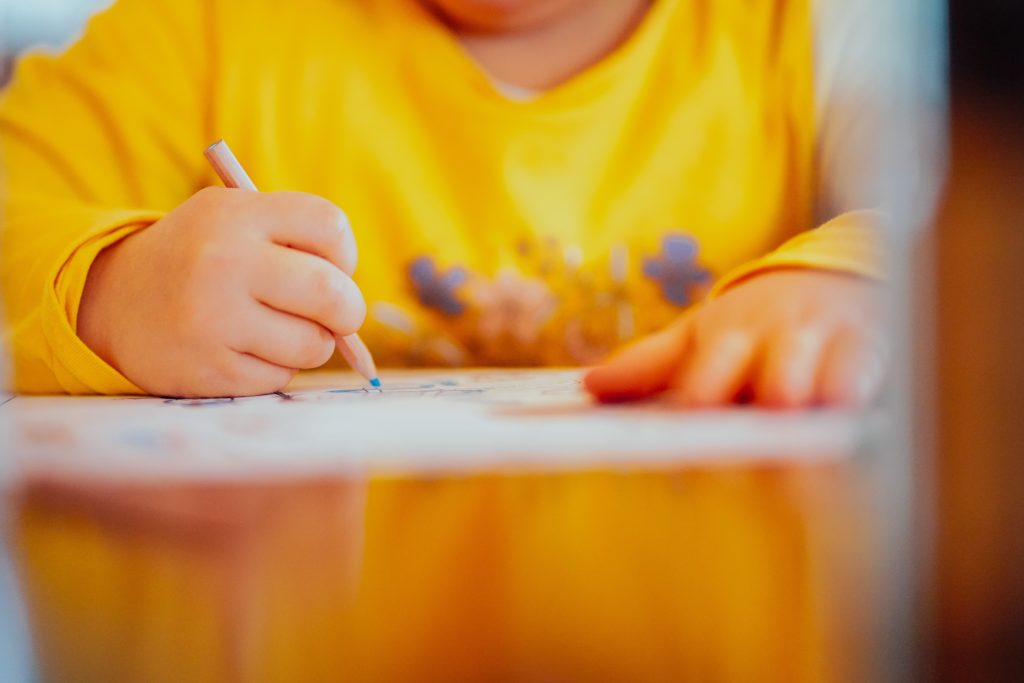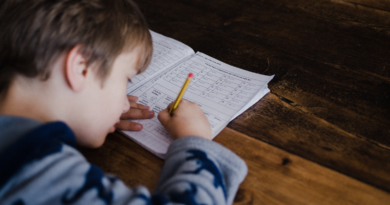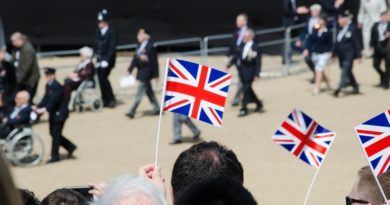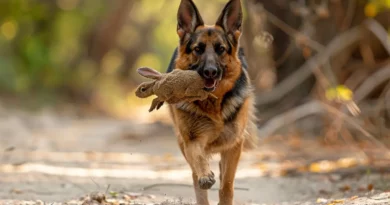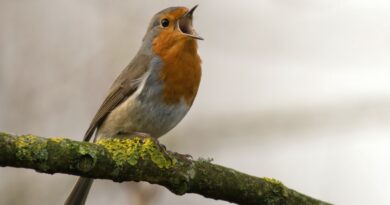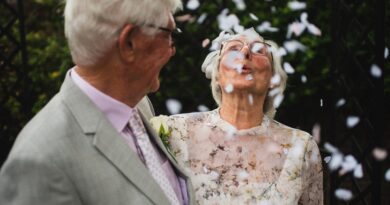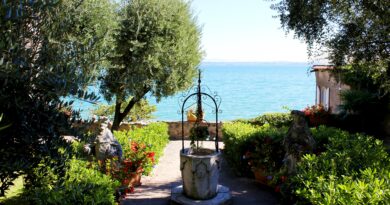Story | Once upon a time
| Audio | |
|---|---|
Normal | Slow |
| English Transcript | Tradução |
| Once Upon a time | Era uma Vez |
| Helen Buckley | Helen Buckley |
| Once upon a time there was a very small boy who contrasted with a very large school. One morning, the teacher said: | Era uma vez um menininho bastante pequeno que contrastava com a escola bastante grande. Uma manhã, a professora disse: |
| - Today we will make a drawing. | Hoje nós iremos fazer um desenho. |
| "How nice!", thought the little boy. He liked to draw lions, tigers, chickens, cows, trains and boats | "Que bom!", pensou o menininho. Ele gostava de desenhar leões, tigres, galinhas, vacas, trens e barcos |
| He took out his box of colored pencils and started drawing. The teacher then said: | Pegou a sua caixa de lápis-de-cor e começou a desenhar. A professora então disse: |
| Wait, it's not time to start yet! | Esperem, ainda não é hora de começar ! |
| She waited until everyone was ready. | Ela esperou até que todos estivessem prontos. |
| Now, said the teacher, we will draw flowers. | Agora, disse a professora, nós iremos desenhar flores. |
| And the little boy started to draw pretty flowers with his pink, orange and blue pencils. | E o menininho começou a desenhar bonitas flores com seus lápis rosa, laranja e azul. |
| The teacher said: | A professora disse: |
| Wait! I'll show you how to do it. | Esperem! Vou mostrar como fazer. |
| And the flower was red with a green stem. | E a flor era vermelha com caule verde. |
| So, said the teacher, now you can start. | Assim, disse a professora, agora vocês podem começar. |
| The little boy looked at the teacher's flower, then looked at his flower. | O menininho olhou para a flor da professora, então olhou para a sua flor. |
| He liked his flower better, but he couldn't say it. | Gostou mais da sua flor, mas não podia dizer isso. |
| He turned the paper over and drew a flower just like the teacher's. | Virou o papel e desenhou uma flor igual à da professora. |
| It was red with a green stem. | Era vermelha com caule verde. |
| On another day, when the little boy was in class outdoors, the teacher said: | Num outro dia, quando o menininho estava em aula ao ar livre, a professora disse: |
| Today we are going to do something with the clay. | Hoje nós iremos fazer alguma coisa com o barro. |
| How nice ! Thought the little boy. | Que bom! Pensou o menininho. |
| He liked to work with clay. I could do all kinds of things with him: elephants, mice, cars and trucks. He started collecting and kneading his clay ball. | Ele gostava de trabalhar com barro. Podia fazer com ele todos os tipos de coisas: elefantes, camundongos, carros e caminhões. Começou a juntar e amassar a sua bola de barro. |
| Then, the teacher said: | Então, a professora disse: |
| Wait! It's not time to start! | Esperem ! Não é hora de começar ! |
| She waited until everyone was ready. | Ela esperou até que todos estivessem prontos. |
| Now, said the teacher, we are going to make a dish. | Agora, disse a professora, nós iremos fazer um prato. |
| How nice! thought the little boy. | Que bom! -- pensou o menininho. |
| He liked to make dishes of all shapes and sizes. The teacher said: | Ele gostava de fazer pratos de todas as formas e manhos. A professora disse: |
| Wait! I'll show you how. So, now you can start. | Esperem ! Vou mostrar como se faz. Assim, agora vocês podem começar. |
| And the dish was a deep dish. | E o prato era um prato fundo. |
| The little boy looked at the teacher's plate, looked at his own plate and liked his own better, but he couldn't say that. | O menininho olhou para o prato da professora, olhou para o próprio prato e gostou mais do seu, mas ele não podia dizer isso. |
| He kneaded his clay into a large ball again and made a deep dish, just like the teacher's. | Amassou seu barro numa grande bola novamente e fez um prato fundo, igual ao da professora. |
| And very early on the little boy learned to wait and look and do things just like the teacher. | E muito cedo o menininho aprendeu a esperar e a olhar e a fazer as coisas exatamente como a professora. |
| And very early on he didn't do things for himself anymore. | E muito cedo ele não fazia mais coisas por si próprio. |
| Then it happened that the little boy had to change schools. | Então aconteceu que o menininho teve que mudar de escola. |
| This school was even bigger than the first. | Essa escola era ainda maior que a primeira. |
| One day the teacher said: | Um dia a professora disse: |
| Today we are going to make a drawing. | Hoje nós vamos fazer um desenho. |
| How nice! thought the little boy and waited for the teacher to say what to do. | Que bom! pensou o menininho e esperou que a professora dissesse o que fazer. |
| She did not say. | Ela não disse. |
| She just walked around the room. | Apenas andava pela sala. |
| Then she came to the little boy and said: | Então veio até o menininho e disse: |
| You don't want to draw? | Você não quer desenhar ? |
| Yes, and what are we going to do? | Sim, e o que é que nós vamos fazer ? |
| I don't know, until you do. | Eu não sei, até que você o faça. |
| How can I do it? | Como eu posso fazê-lo ? |
| Any way you like it. | Da maneira que você gostar. |
| And what color? | E de que cor ? |
| If everyone makes the same drawing and uses the same colors, how can I know each one's drawing? | Se todo mundo fizer o mesmo desenho e usar as mesmas cores, como eu posso saber o desenho de cada um ? |
| I do not know . . . | Eu não sei . . . |
| And then the little boy started drawing a red flower with a green stem | E então o menininho começou a desenhar uma flor vermelha com o caule verde |
Contagem de palavras
A tabela abaixo exibe as palavras encontradas neste texto bem como o número de vezes em que aparecem.
| Freq. | Palavra | Freq. | Palavra | Freq. | Palavra |
|---|---|---|---|---|---|
| 36 | the | 22 | and | 17 | to |
| 15 | a | 13 | boy | 12 | teacher |
| 12 | little | 11 | said | 11 | he |
| 10 | do | 8 | with | 8 | was |
| 8 | how | 8 | his | 7 | you |
| 6 | we | 6 | then | 6 | it |
| 6 | flower | 6 | drawing | 5 | wait |
| 5 | she | 5 | liked | 5 | I |
| 4 | very | 4 | time | 4 | thought |
| 4 | teacher's | 4 | started | 4 | start |
| 4 | say | 4 | now | 4 | not |
| 4 | nice | 4 | make | 4 | looked |
| 4 | like | 4 | just | 4 | going |
| 4 | draw | 4 | dish | 4 | clay |
| 4 | can | 4 | at | 4 | are |
| 3 | what | 3 | waited | 3 | until |
| 3 | today | 3 | things | 3 | stem |
| 3 | red | 3 | on | 3 | of |
| 3 | know | 3 | green | 3 | everyone |
| 2 | will | 2 | upon | 2 | that |
| 2 | so | 2 | show | 2 | school |
| 2 | same | 2 | ready | 2 | plate |
| 2 | pencils | 2 | own | 2 | one |
| 2 | once | 2 | large | 2 | it's |
| 2 | I'll | 2 | for | 2 | flowers |
| 2 | early | 2 | don't | 2 | deep |
| 2 | day | 2 | couldn't | 2 | but |
| 2 | better | 2 | ball | 2 | all |
| 1 | yet | 1 | yes | 1 | work |
| 1 | who | 1 | when | 1 | way |
| 1 | want | 1 | walked | 1 | uses |
| 1 | turned | 1 | trucks | 1 | trains |
| 1 | took | 1 | tigers | 1 | this |
| 1 | there | 1 | than | 1 | something |
| 1 | small | 1 | sizes | 1 | shapes |
| 1 | schools | 1 | room | 1 | pretty |
| 1 | pink | 1 | paper | 1 | over |
| 1 | outdoors | 1 | out | 1 | orange |
| 1 | one's | 1 | morning | 1 | mice |
| 1 | makes | 1 | made | 1 | look |
| 1 | lions | 1 | learned | 1 | kneading |
| 1 | kneaded | 1 | kinds | 1 | into |
| 1 | in | 1 | if | 1 | himself |
| 1 | him | 1 | helen | 1 | happened |
| 1 | had | 1 | first | 1 | even |
| 1 | elephants | 1 | each | 1 | drew |
| 1 | dishes | 1 | didn't | 1 | did |
| 1 | cows | 1 | could | 1 | contrasted |
| 1 | colors | 1 | colored | 1 | color |
| 1 | collecting | 1 | class | 1 | chickens |
| 1 | change | 1 | cars | 1 | came |
| 1 | buckley | 1 | box | 1 | boats |
| 1 | blue | 1 | bigger | 1 | around |
| 1 | anymore | 1 | any | 1 | another |
| 1 | again |

